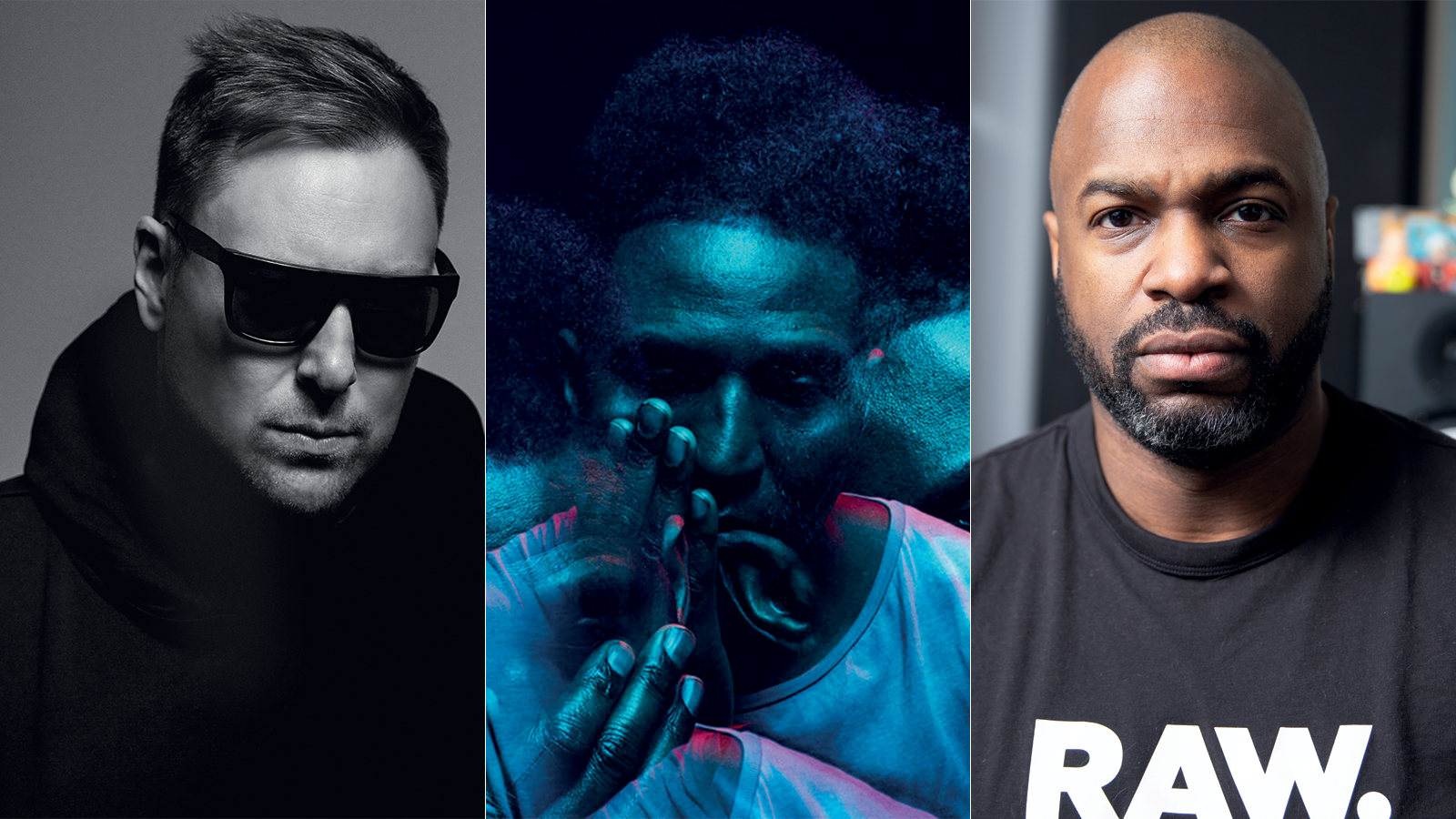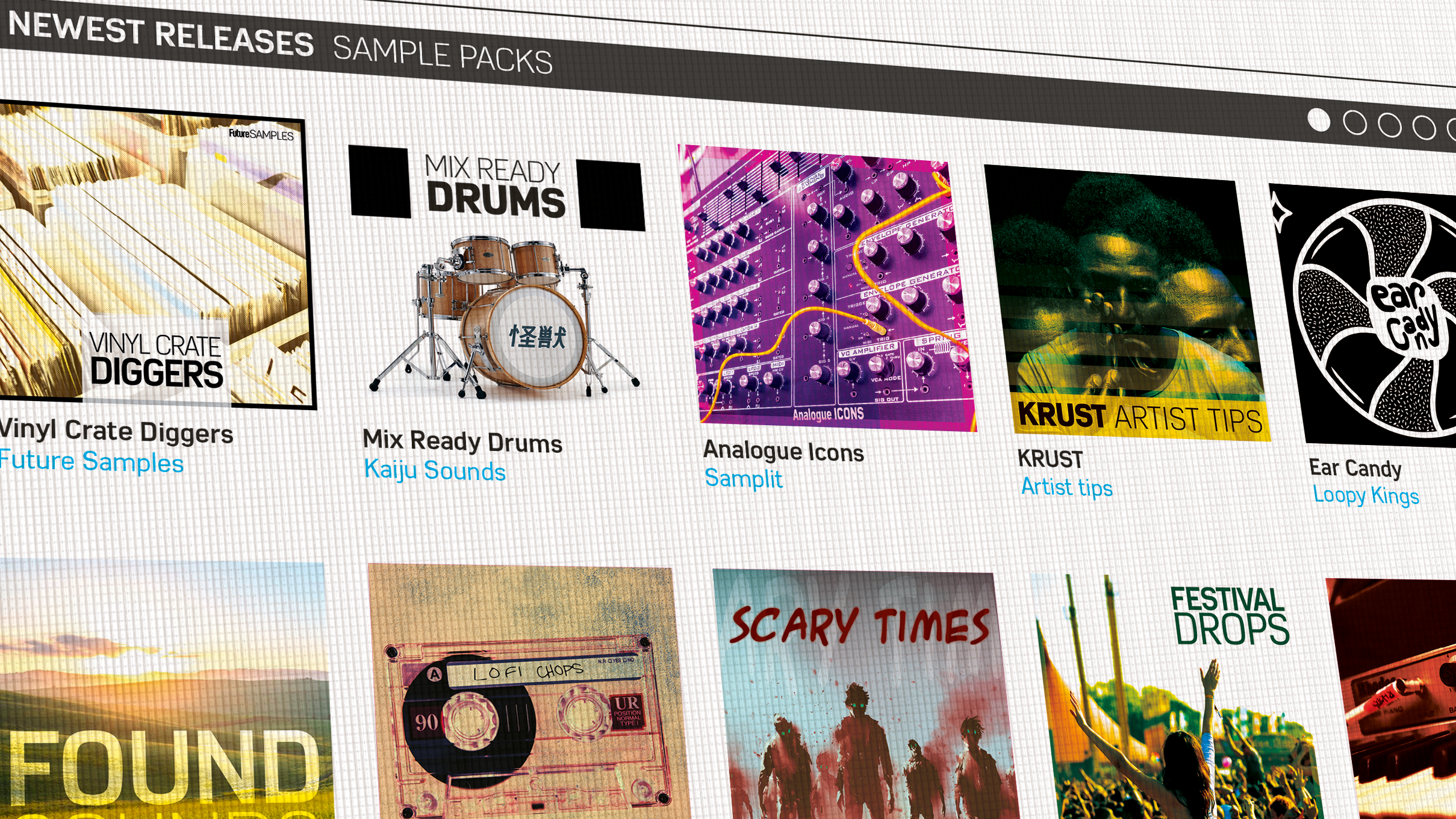Krust, Demuir and UMEK share their advice on how to create sample packs
Three artists deliver their top tips for curating an ear-catching pack of sounds

Krust, Demuir and UMEK are electronic artists at the top of their game. Krust, a Bristol-based pioneer of drum & bass, is widely known for his influential solo productions, his work with the Mercury Prize-winning collective Reprazent and the Full Cycle Records crew, which he co-founded with Roni Size.

Demuir is a gifted purveyor of all things house music, with his slinky, soulful productions landing on Hot Creations, Elrow Music and Yoruba Records to widespread acclaim. Award-winning Slovenian producer Umek is the founder of techno label 1605 and has notched up nearly three decades in the business.
All three of these producers have first-hand experience creating their own carefully curated, meticulously produced sample packs. We spoke to them about how they approached the process of developing their own packs, and they shared some essential advice for doing the same.
Krust
Krust’s sample pack for Beatport Sounds and Loopcloud, Bristol Drum And Bass, is a collection of samples aimed at capturing the legendary Bristol sound. “What I tried to achieve was giving people my own personal take on jungle and drum & bass,” Krust tells us. “This is why I make jungle, these are the sounds that I like, this is the way that I loop my beats, this is the way that my bass sounds.
“I’m in this space now where I’m really interested in how to create inspiration tools,” Krust says. “I’m not just inspired by music – I’m inspired by culture, by ideas, by things that when I come back to the studio, get my notepad out or get my camera out, I’m like: ‘this made me feel this way, or that made me feel that way.’ That’s what a good sample pack does.”
Aim to inspire people
“One of the beautiful things about being a musician – especially how jungle and drum & bass started in the beginning – we were taking breaks from anywhere, any genre, any idea, and we were making it work within our specific wheelhouse. That’s the idea when you’re creating sample packs. Don’t be too specific, create something that opens people’s minds, expands their creativity, helps them think outside of the box. By definition music itself is a personal experience, right? It’s about everybody creating something that’s unique to them, that they were inspired by and other people find interesting.”
Nail your setup before you start
“It’s really about setting up the processing chains, and having your room set up. The setup is really vital. I’ve been known to take up to a year to set my room up before I start a project – maybe two.”
Want all the hottest music and gear news, reviews, deals, features and more, direct to your inbox? Sign up here.
Don't use the same equipment as everybody else
“The whole point of you being a creator is to create something that nobody else is creating, to create a brand that stands out. If you want to create your own sound, research what your favourite pieces of equipment are. Don’t be afraid to go to secondhand shops and buy beat-up samplers, keyboards, speakers, equipment that nobody else is using.”
Do your homework
“If you want to be a creator and an artist, you have to dig deep, you
have to research your art form.
“First and foremost: who do you admire? Who really takes their craft seriously, who goes the extra mile to be recognised? They might not even be successful now, but they have a sound or a look or a vibe that stands out. Study them, find out what makes them unique.”
Take an improvisatory approach
“It’s all about jamming. It’s all about improvising, it’s all about catching a vibe. It’s all about being consistently in that space for long periods of time. I have a thing where I say: don’t stop thinking. You’re relying on instinct, imagination or intuition to really push you to a place where you don’t normally go. You start off with what you know, you start off with that familiarity, you start off with this pool of sounds that you know works. Then you just keep moving forward, and then you’re open to which direction it takes you in.”
Rinse and repeat
“Work to exhaustion, create as much material as you can, and then go through it and fine-tune it. Then go again, narrow it down and figure out what works as a direction. Then go again, make some more stuff. Rinse and repeat like this five or six times, until you get to this melting pot where you think: OK, I’ve got the bulk of the project. Now let’s just cherry pick all the best sounds and make it work.”
Think deeply about your goals
“Work on your own psychology. Why is it important for you to make a sample pack? How is it going to be different from everybody else’s? Set out the time that you’re going to do that, think about what sort of time you’re going to put into it. What does your day look like? How committed are you to pushing yourself into this uncomfortable space?”
Krust’s Bristol Drum & Bass sample pack is available now via Beatport Sounds.
Demuir
Demuir’s sample pack for Loopmasters, House Crates, is described as an ode to Toronto’s underground electronic music scene that’s inspired by the city’s cultural diversity.
“My goal with this sample pack was to exhaust every piece of kit in my studio as best as possible and deliver something producers can actually use and make their own,” Demuir tells us.
House Crates was produced using a broad range of gear. “For synths, I used Arturia’s MatrixBrute, MiniBrute and MicroFreak along with the Moog Subsequent 37, Behringer DeepMind 12, and the Roland System-8, along with the Akai MPC X and NI Maschine for drum programming. All of these instruments have a nice analogue component and a sound I just love.”
Demuir carefully applied processing to certain samples that needed a lift, while leaving others as they were. “I didn’t have to process all the time,” he says. “Some sounds just sound better untouched, however, the majority of items went through the 610 preamp on my UAD Apollo 8s and Apollo Twin.”
Stand out from the crowd
“I highly encourage producers to do things that have their signature sound. People know my drums at this point and it’s reflected in my pack. It’s important to separate yourself from the masses.”
Make usable samples
“The core difference between an average sample pack and an excellent one is ensuring the sounds and loops in the package are things producers can actually use, and don’t sound like every other pack that’s out there.”
Sample all the time
“Get in the habit of sampling things that you like on a regular basis. You’ll be amazed at what you accumulate over six months to a year.”
Reuse old or unfinished projects for samples
“For my pack, I was digging around in my old and latest hard drives for previous projects I left as sketches. If something caught my ear, I would pull that for sampling.”
Get creative with found sounds
“I sampled real-world sounds for my pack, but you wouldn’t know that they were real world at first listen. I think I made a pretty dope snare from tapping on my kitchen counter, and with loads of processing, I got something cool.”
Use your musical instincts
“I was combing through tons of content to find the sounds that made my pack. We are talking about over 500+ Reason projects, a plethora of sounds between hard drives, MPC X, and whatever I grooved to from the synths. As a result, I treated this like I do with production and just went with what felt right to me intuitively, to keep in terms of what I would use to make a beat.”
Demuir’s House Crates sample pack is available now via Loopmasters.
UMEK
For his latest sample pack, Techno Foundations, UMEK focused on giving producers the kind of samples that his production students were asking for – sounds that he felt people actually wanted to use.
“All of my students are asking me about kicks first, then the rumble bass, hi-hats, percussion and stuff like that,” UMEK tells us. “I realised that everybody is struggling in that area and I said OK, let’s give them the UMEK signature, and some more percussive sounds.”
UMEK raided some of the older projects in this arsenal for inspiration, sampling material that he’d previously made while using contemporary plugins to give the sounds a modern edge.
“The approach was to reuse old stuff and process it differently with new plugins to match the modern sound of today. The plugins mostly used were by FabFilter – FabFilter is something I use all the time – but also a lot of stock plugins that
come with Logic. There were no real-world sounds – it’s all sample-based and the melodies were made using Serum.”
Look to the past for inspiration
“Don’t sample stuff that’s only been out there for a year or so. I can hear a lot of stuff in sample packs that builds on samples that have been recently released. I use samples as well, but I go ten years back, so people have forgotten about those samples, and then I make them into something different.”
Don't overthink
“Everybody is looking for the perfect sample, but I’ve learned that processing and making a sample fit into the track is what makes it sound really good.
“Even if I process a kick and you can hear it sounds really good on its own, that doesn’t mean it’s gonna work on a track and it will obviously need some tweaking.
“So every sample that I do is ready to go, but if you get deeper into the mix you will need to adjust some stuff to your needs.”
One man's trash...
“Even material that’s not perfect can still be good. I always think there are producers who will be able to use it, be inspired by it and make something out of it.
“This is why when I get some loops some people wouldn’t even touch, I can make something out of it, maybe something really big out of it. It’s just the perception. One man’s trash is another man’s gold!”
UMEK’s Techno Foundations sample pack is available now via Loopmasters.



I'm MusicRadar's Tech Editor, working across everything from product news and gear-focused features to artist interviews and tech tutorials. I love electronic music and I'm perpetually fascinated by the tools we use to make it.